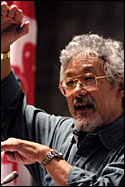Suzuki sizzles
People need to remember that we are biological beings and stop believing that to care for the environment hurts the economy, celebrated environmentalist, broadcaster and teacher Dr. David Suzuki told a 600-strong capacity crowd packing Room 132 of the Leacock Building March 28. Another 200 people watched the speech, organized by the Science Undergraduate Society, on a screen set up in a neighbouring room.
 Dr. David Suzuki
Dr. David SuzukiPHOTO: Andrew Dobrowolskyj |
|
"Our bottom line is the economy," said Suzuki, the author of more than 30 books. But because we're preoccupied with economic growth, he says human beings forget "everything is interconnected in the natural world.
"We need air, water, soil and fire. What is giving us air, water, soil and fire is the web of living things, biodiversity. What intelligent creature, knowing what we know, would continue to tear at the web of living things without considering what the consequences will be?"
According to Suzuki, "We opt for the benefits of what the technologies will do" instead of considering consequences.
For example, DDT was developed to kill insects even though ecologists know the crucial role insects play in pollinating plants, cleaning carcasses, controlling other pests, and that many species, including humans, depend on them.
"That's like saying we've got a crime on the McGill campus, let's kill everyone at McGill," he said. "Here we are, knowing how important insects are, and we're killing insects. We thought, 'Wow, through chemistry we're going to destroy those pests.'"
Later, birdwatchers noticed birds disappearing, Suzuki said. DDT becomes increasingly concentrated and toxic as it makes its way up the food chain, up to birds and beyond, a process called biomagnification. "How could we possibly have regulated DDT in the 1930s when we didn't know about biomagnification?
"There is no reason to believe the case of genetically modified organisms will be any different," he said. "All of these grand claims biotechnologists are making, these are hypothetical claims. To be responsible, all the negative things that could happen should be given equal weight as well."
Interviewing a Haida leader, Suzuki asked why the man fought a logging project even though his community faced 80 percent unemployment. The answer? "Once the trees are gone, we won't be Haida anymore. We'll just be like everybody else."
"That's a radically different way of looking at the world. We see opportunity. We see resources. We see commodities. We see wealth. To the Haida it's a radically different thing. Their identity is tied to the land.
"We are the environment. We are the Earth," Suzuki said. "Before you think I've totally flipped out, I mean this in a scientific, demonstrable way." For example, our bodies are 70 percent water. "We are a big blob of water with organic thickener added so we won't dribble away on the floor."
People, especially city dwellers, don't connect a worldwide epidemic of asthma and other environmental problems to the way we treat air, water and soil, he argues. Instead, we believe our political and business leaders when they describe the economy as the "source of everything we need."
Politicians and business leaders constantly stress the importance of a growing gross domestic product, Suzuki said. But economists don't subtract damage to the environment from the GDP or include the services nature performs for us.
One study estimates nature's role as worth $35 trillion (U.S.). "Goddamn economists, think they can put a price tag on things. There are some things that are beyond economic value, that are sacred."
Social needs need to be met as much as environmental needs, Suzuki said. Ensuring stable, strong families, meeting needs for love and spirituality and for meaningful, full employment are crucial to making sure people respect the environment.
"I've been characterized by the right-wing press as this depressing doom and gloom guy," said Suzuki. To counter this image he says his latest book, cowritten with Holly Dressel, Good News for a Change, showcases solutions. "There's all kinds of stuff happening, not just at the grassroots level." Even businesses and governments are getting involved.
But there are still plenty of bad guys. Suzuki accused Alberta premier Ralph Klein of "neanderthal thinking" for arguing that to comply with the Kyoto Accord to reduce global warming would have devastating effects on Alberta's economy. An "overwhelming majority of scientists" support the accord, Suzuki said, and the "handful of scientists" opposing it are funded by opponents.
"Every scientist should be outraged," said Suzuki. "Not only is Kyoto affordable but it presents enormous economic opportunities (to) save millions of dollars."

